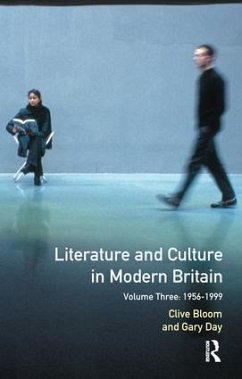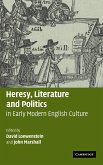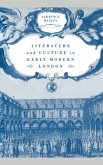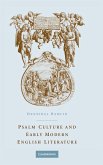Literature and Culture in Modern Britain
Volume Three: 1956 - 1999
Herausgeber: Bloom, Clive; Day, Gary
Literature and Culture in Modern Britain
Volume Three: 1956 - 1999
Herausgeber: Bloom, Clive; Day, Gary
- Gebundenes Buch
- Merkliste
- Auf die Merkliste
- Bewerten Bewerten
- Teilen
- Produkt teilen
- Produkterinnerung
- Produkterinnerung
This volume examines the transformations in British literature and culture over the last forty years. Each chapter concentrates on a facet of British culture over the last half century from painting to poetry, from the seriousness of the novel to the postmodern ironies of the computing age.
Andere Kunden interessierten sich auch für
![Eugenics, Literature, and Culture in Post-war Britain Eugenics, Literature, and Culture in Post-war Britain]() Clare HansonEugenics, Literature, and Culture in Post-war Britain217,99 €
Clare HansonEugenics, Literature, and Culture in Post-war Britain217,99 €![Heresy, Literature and Politics in Early Modern English Culture Heresy, Literature and Politics in Early Modern English Culture]() David Loewenstein / John Marshall (eds.)Heresy, Literature and Politics in Early Modern English Culture71,99 €
David Loewenstein / John Marshall (eds.)Heresy, Literature and Politics in Early Modern English Culture71,99 €![Literature and Culture in Early Modern London Literature and Culture in Early Modern London]() Lawrence ManleyLiterature and Culture in Early Modern London150,99 €
Lawrence ManleyLiterature and Culture in Early Modern London150,99 €![Psalm Culture and Early Modern English Literature Psalm Culture and Early Modern English Literature]() Hannibal HamlinPsalm Culture and Early Modern English Literature71,99 €
Hannibal HamlinPsalm Culture and Early Modern English Literature71,99 €![Translating Women in Early Modern England Translating Women in Early Modern England]() Selene ScarsiTranslating Women in Early Modern England204,99 €
Selene ScarsiTranslating Women in Early Modern England204,99 €![Brexit and Literature Brexit and Literature]() Brexit and Literature63,99 €
Brexit and Literature63,99 €![Equity in English Renaissance Literature Equity in English Renaissance Literature]() Andrew MajeskeEquity in English Renaissance Literature140,99 €
Andrew MajeskeEquity in English Renaissance Literature140,99 €-
-
-
This volume examines the transformations in British literature and culture over the last forty years. Each chapter concentrates on a facet of British culture over the last half century from painting to poetry, from the seriousness of the novel to the postmodern ironies of the computing age.
Hinweis: Dieser Artikel kann nur an eine deutsche Lieferadresse ausgeliefert werden.
Hinweis: Dieser Artikel kann nur an eine deutsche Lieferadresse ausgeliefert werden.
Produktdetails
- Produktdetails
- Verlag: Taylor & Francis
- Seitenzahl: 302
- Erscheinungstermin: 23. Dezember 2016
- Englisch
- Abmessung: 216mm x 140mm x 18mm
- Gewicht: 499g
- ISBN-13: 9781138177123
- ISBN-10: 1138177121
- Artikelnr.: 69945309
- Herstellerkennzeichnung
- Libri GmbH
- Europaallee 1
- 36244 Bad Hersfeld
- gpsr@libri.de
- Verlag: Taylor & Francis
- Seitenzahl: 302
- Erscheinungstermin: 23. Dezember 2016
- Englisch
- Abmessung: 216mm x 140mm x 18mm
- Gewicht: 499g
- ISBN-13: 9781138177123
- ISBN-10: 1138177121
- Artikelnr.: 69945309
- Herstellerkennzeichnung
- Libri GmbH
- Europaallee 1
- 36244 Bad Hersfeld
- gpsr@libri.de
Clive Bloom is a reader in English and American Studies at Middlesex University. He is the author and editor of many books on popular literature and culture, recipient of literary awards from the Horror Writers Association and the International Horror Guild, and a nominee for the British Library Association. Gary Day is a principal lecturer and subject leader of English at De Montfort University. He is the author of Re-reading Leavis- 'Culture' and Literary Criticism and of a forthcoming book, Class. He is also the editor of a number of books on literature and culture.
Acknowledgements
Series Preface
List of Contributors
Chronology
Introduction Gary Day
Econornic and social policy
Culture
Conclusion
1. British Poetry 1956-99 Jessíca Maynard
The poetics of cliché
Chance encounters: Larkin, Tornlinson
Metamorphoses: Fisher, Clark
Autobiographies: Betjeman, Bunting, Prynne
Two varieties of irony
2. Novel Voices Steven Eamshaw
Rogue males
Lone voices
From the rniddle-brow to the high forehead:
women-centred fiction
The dark gods
Empire
Experimental literature
Genre fiction
The postmodem
'There's no such thing as society .. .'
Martin Arnis
Voice projections
Líterature and Culture in Modern Britain: 1956-99
3. Popular Fiction Michael Hayes
Market stall to global market
Fictions galo re
Consuming passions
Popular fiction: The Legacy
4. Lifting the Lid: Theatre 1956-99 Michael Woolf
Prologue
What is 'theatre'?
Beyond censorship
Lost Edens: politics and nostalgia
A humanist theatre
The music hall
Joe Orton and the outrage of Mrs Edna Welthorpe
The presence of Harold Pinter
Ayckboum: a singular exception
Conclusion: theatre and the segmented society
5. British Newspapers Nicho/as Rance
'A dreadful, long-running detective story': reporting the
case of the Y orkshire Ripper
Conclusion
6. British Cinema: A Struggle for Identity Lez Cooke 143
The British 'new wave'
The social problem film
Harnmer horror: the retum of the repressed
Carry On and the 'camivalesque'
The Empire strikes back?
'Swinging London'
The 1970s: mainstream decline and the rise of
independent cinema
British cinema and Thatcherism
The British film renaissance of the 1990s
7. Television Lez Cooke
The impact of ITV on the BBC
The 'Golden Age' of British television
British television in the 1970s: a mirror to society?
The 1980s: Channel 4, competition and deregulation
British television in the 1990s
8. British Art David Masters
The avant-garde moves home: Paris to New York
'The situation in London now'
Abstraction - a new realism? 206
...and the situation in St Ives 208
IG, TIT and pop 209
Later pop 210
Challenging modernism: artists with attitude 212
When concept replaced the unique art object 215
A crisis of modernity? The emergence of postmodernism
and anti-modernism 217
'Nostalgia for the unattainable' 218
Some went mad o o o some ran away 219
9. Popular Music since the 1950s Andrew Blake 224
Popular music before pop 224
Aspects of amateurism: folk roots and r 'n' b 226
Professionalism and pop 227
The 1960s and after 228
The ambivalence of broadcasting 230
y outh and music 231
The urban soundscape 233
Let's mix again 235
10. Technology 1956-99 John Moms 239
What is technology and where is it taking us? 239
The information explosion 242
Genetic engineering 246
Outcomes of the high techo process 252
Final thoughts 255
11. Epilogue and Overture Clive Bloom
The role of the university
Criticism at the end of the century
N ew and future approaches
British culture at the Millennium
Index
Series Preface
List of Contributors
Chronology
Introduction Gary Day
Econornic and social policy
Culture
Conclusion
1. British Poetry 1956-99 Jessíca Maynard
The poetics of cliché
Chance encounters: Larkin, Tornlinson
Metamorphoses: Fisher, Clark
Autobiographies: Betjeman, Bunting, Prynne
Two varieties of irony
2. Novel Voices Steven Eamshaw
Rogue males
Lone voices
From the rniddle-brow to the high forehead:
women-centred fiction
The dark gods
Empire
Experimental literature
Genre fiction
The postmodem
'There's no such thing as society .. .'
Martin Arnis
Voice projections
Líterature and Culture in Modern Britain: 1956-99
3. Popular Fiction Michael Hayes
Market stall to global market
Fictions galo re
Consuming passions
Popular fiction: The Legacy
4. Lifting the Lid: Theatre 1956-99 Michael Woolf
Prologue
What is 'theatre'?
Beyond censorship
Lost Edens: politics and nostalgia
A humanist theatre
The music hall
Joe Orton and the outrage of Mrs Edna Welthorpe
The presence of Harold Pinter
Ayckboum: a singular exception
Conclusion: theatre and the segmented society
5. British Newspapers Nicho/as Rance
'A dreadful, long-running detective story': reporting the
case of the Y orkshire Ripper
Conclusion
6. British Cinema: A Struggle for Identity Lez Cooke 143
The British 'new wave'
The social problem film
Harnmer horror: the retum of the repressed
Carry On and the 'camivalesque'
The Empire strikes back?
'Swinging London'
The 1970s: mainstream decline and the rise of
independent cinema
British cinema and Thatcherism
The British film renaissance of the 1990s
7. Television Lez Cooke
The impact of ITV on the BBC
The 'Golden Age' of British television
British television in the 1970s: a mirror to society?
The 1980s: Channel 4, competition and deregulation
British television in the 1990s
8. British Art David Masters
The avant-garde moves home: Paris to New York
'The situation in London now'
Abstraction - a new realism? 206
...and the situation in St Ives 208
IG, TIT and pop 209
Later pop 210
Challenging modernism: artists with attitude 212
When concept replaced the unique art object 215
A crisis of modernity? The emergence of postmodernism
and anti-modernism 217
'Nostalgia for the unattainable' 218
Some went mad o o o some ran away 219
9. Popular Music since the 1950s Andrew Blake 224
Popular music before pop 224
Aspects of amateurism: folk roots and r 'n' b 226
Professionalism and pop 227
The 1960s and after 228
The ambivalence of broadcasting 230
y outh and music 231
The urban soundscape 233
Let's mix again 235
10. Technology 1956-99 John Moms 239
What is technology and where is it taking us? 239
The information explosion 242
Genetic engineering 246
Outcomes of the high techo process 252
Final thoughts 255
11. Epilogue and Overture Clive Bloom
The role of the university
Criticism at the end of the century
N ew and future approaches
British culture at the Millennium
Index
Acknowledgements
Series Preface
List of Contributors
Chronology
Introduction Gary Day
Econornic and social policy
Culture
Conclusion
1. British Poetry 1956-99 Jessíca Maynard
The poetics of cliché
Chance encounters: Larkin, Tornlinson
Metamorphoses: Fisher, Clark
Autobiographies: Betjeman, Bunting, Prynne
Two varieties of irony
2. Novel Voices Steven Eamshaw
Rogue males
Lone voices
From the rniddle-brow to the high forehead:
women-centred fiction
The dark gods
Empire
Experimental literature
Genre fiction
The postmodem
'There's no such thing as society .. .'
Martin Arnis
Voice projections
Líterature and Culture in Modern Britain: 1956-99
3. Popular Fiction Michael Hayes
Market stall to global market
Fictions galo re
Consuming passions
Popular fiction: The Legacy
4. Lifting the Lid: Theatre 1956-99 Michael Woolf
Prologue
What is 'theatre'?
Beyond censorship
Lost Edens: politics and nostalgia
A humanist theatre
The music hall
Joe Orton and the outrage of Mrs Edna Welthorpe
The presence of Harold Pinter
Ayckboum: a singular exception
Conclusion: theatre and the segmented society
5. British Newspapers Nicho/as Rance
'A dreadful, long-running detective story': reporting the
case of the Y orkshire Ripper
Conclusion
6. British Cinema: A Struggle for Identity Lez Cooke 143
The British 'new wave'
The social problem film
Harnmer horror: the retum of the repressed
Carry On and the 'camivalesque'
The Empire strikes back?
'Swinging London'
The 1970s: mainstream decline and the rise of
independent cinema
British cinema and Thatcherism
The British film renaissance of the 1990s
7. Television Lez Cooke
The impact of ITV on the BBC
The 'Golden Age' of British television
British television in the 1970s: a mirror to society?
The 1980s: Channel 4, competition and deregulation
British television in the 1990s
8. British Art David Masters
The avant-garde moves home: Paris to New York
'The situation in London now'
Abstraction - a new realism? 206
...and the situation in St Ives 208
IG, TIT and pop 209
Later pop 210
Challenging modernism: artists with attitude 212
When concept replaced the unique art object 215
A crisis of modernity? The emergence of postmodernism
and anti-modernism 217
'Nostalgia for the unattainable' 218
Some went mad o o o some ran away 219
9. Popular Music since the 1950s Andrew Blake 224
Popular music before pop 224
Aspects of amateurism: folk roots and r 'n' b 226
Professionalism and pop 227
The 1960s and after 228
The ambivalence of broadcasting 230
y outh and music 231
The urban soundscape 233
Let's mix again 235
10. Technology 1956-99 John Moms 239
What is technology and where is it taking us? 239
The information explosion 242
Genetic engineering 246
Outcomes of the high techo process 252
Final thoughts 255
11. Epilogue and Overture Clive Bloom
The role of the university
Criticism at the end of the century
N ew and future approaches
British culture at the Millennium
Index
Series Preface
List of Contributors
Chronology
Introduction Gary Day
Econornic and social policy
Culture
Conclusion
1. British Poetry 1956-99 Jessíca Maynard
The poetics of cliché
Chance encounters: Larkin, Tornlinson
Metamorphoses: Fisher, Clark
Autobiographies: Betjeman, Bunting, Prynne
Two varieties of irony
2. Novel Voices Steven Eamshaw
Rogue males
Lone voices
From the rniddle-brow to the high forehead:
women-centred fiction
The dark gods
Empire
Experimental literature
Genre fiction
The postmodem
'There's no such thing as society .. .'
Martin Arnis
Voice projections
Líterature and Culture in Modern Britain: 1956-99
3. Popular Fiction Michael Hayes
Market stall to global market
Fictions galo re
Consuming passions
Popular fiction: The Legacy
4. Lifting the Lid: Theatre 1956-99 Michael Woolf
Prologue
What is 'theatre'?
Beyond censorship
Lost Edens: politics and nostalgia
A humanist theatre
The music hall
Joe Orton and the outrage of Mrs Edna Welthorpe
The presence of Harold Pinter
Ayckboum: a singular exception
Conclusion: theatre and the segmented society
5. British Newspapers Nicho/as Rance
'A dreadful, long-running detective story': reporting the
case of the Y orkshire Ripper
Conclusion
6. British Cinema: A Struggle for Identity Lez Cooke 143
The British 'new wave'
The social problem film
Harnmer horror: the retum of the repressed
Carry On and the 'camivalesque'
The Empire strikes back?
'Swinging London'
The 1970s: mainstream decline and the rise of
independent cinema
British cinema and Thatcherism
The British film renaissance of the 1990s
7. Television Lez Cooke
The impact of ITV on the BBC
The 'Golden Age' of British television
British television in the 1970s: a mirror to society?
The 1980s: Channel 4, competition and deregulation
British television in the 1990s
8. British Art David Masters
The avant-garde moves home: Paris to New York
'The situation in London now'
Abstraction - a new realism? 206
...and the situation in St Ives 208
IG, TIT and pop 209
Later pop 210
Challenging modernism: artists with attitude 212
When concept replaced the unique art object 215
A crisis of modernity? The emergence of postmodernism
and anti-modernism 217
'Nostalgia for the unattainable' 218
Some went mad o o o some ran away 219
9. Popular Music since the 1950s Andrew Blake 224
Popular music before pop 224
Aspects of amateurism: folk roots and r 'n' b 226
Professionalism and pop 227
The 1960s and after 228
The ambivalence of broadcasting 230
y outh and music 231
The urban soundscape 233
Let's mix again 235
10. Technology 1956-99 John Moms 239
What is technology and where is it taking us? 239
The information explosion 242
Genetic engineering 246
Outcomes of the high techo process 252
Final thoughts 255
11. Epilogue and Overture Clive Bloom
The role of the university
Criticism at the end of the century
N ew and future approaches
British culture at the Millennium
Index








